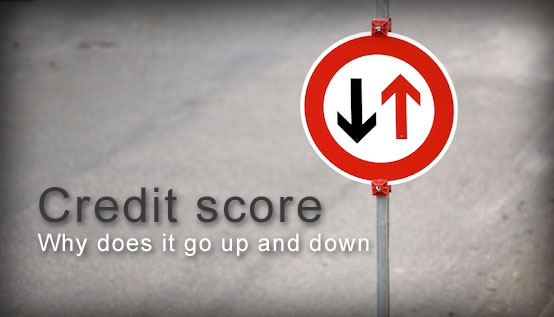
Credit score fluctuations are a normal phenomenon and there is nothing to worry about. Credit score can change from day to day and bureau to bureau. So, next time you see a change in your score, don't get flustered and start panicking.
Credit score can go up and down for various reasons. Several factors affect your score. Once you know about these factors, you'll find out the areas where you need to improve. Why your credit score changes constantly You're not the only one whose credit score changes from time to time. Every one faces the same scenario. If you think little deeply, then you'll realize that your credit card balances change on the basis of number financial transactions. Likewise, your score changes whenever you pay credit card bills or apply for loans. As per Greg Holmes, director of sales and marketing at Credit Plus, “credit is dynamic information”. He says “It's constantly changing. It's up and down and constantly moving. It depends on how much information is coming and going in and out of that credit report”. Reasons behind the rapid changes in your credit score
- You have applied for a new loan: Your credit report will show extra inquiries when you apply for a new loan. A few inquiries won't make any negative impact on your score. However, too many credit inquiries will bring down your score since hard inquiries typically stay on the credit report for around 2 years.
- You have made late payments: This would drop your score significantly. If you happen to pay your bills late, then change your mindset soon. Pay your bills regularly. Consider bill payments as your responsibility and achievement. Even, making the minimum monthly payments can help you. Set up automatic bill payment system so that you don't miss out your payments by any chance.
- Suspicious tradelines are there on your report: If you feel that a suspicious tradeline is there on your credit report, then its a red flag for you. You should ask the credit bureaus to verify the tradeline since this can be an instance of identity-theft. Never hesitate to report your doubts to credit bureaus. If you think any information is wrong or someone has made fraudulent activities with your credit cards, then voice your opinion to bureaus. Don't take too much time in making a decision since maxed out credit cards can drop your score big time.
- You have maxed out your credit cards: Emergency situations may crop up at any time. Someone in your family may fall sick and you may have to pay the medical bills out of your own pocket. Credit cards come to your aid in these situations. You can use those cards and pay the bills. Unfortunately, you cross the credit limit in the process and this drops your score. If you can't afford to clear the outstanding balance every month, then at least pay as much as you can. The idea is to make regular payments. This will help you maintain a proper payment history. The best option is to stay within 1/3 of your credit limit.
Why your credit score differs from bureau to bureau Your credit score differs from bureau to bureau due to different scoring models. For instance, TransUnion and Equifax use VantageScore as their scoring model. On the other hand, FICO uses its own unique scoring model to compute the FICO score. So, there will be small changes in your scores. Apart from the scoring model, there are a few other factors that lead to differences in your score.
- Creditors don't report to all the bureaus: Your score is computed on the basis of the information contained in your credit reports. Creditors and debt collectors don't report to all the credit bureaus. Some lenders may report to Equifax and Experian whereas others may provide information to TransUnion only.
- Creditors give information at different times: Different creditors provide information to the credit bureaus at various times. So, some credit bureaus will have updated information and that will be reflected on your score.
- You've applied for a loan under another name: Credit bureaus will have incomplete files when you apply for a loan under another name. Usually, credit bureaus keep all the files together for the same person. However, there have been many cases wherein incomplete files have lead to gross errors on credit report. For instance, your credit information may appear on someone else's credit report.
Other Scenarios when your credit score can change Your credit score can change under the following 2 scenarios.
- An old tradeline has been removed: Credit history constitutes a significant portion of your score. When a tradeline is removed or deleted from your credit report, it affects your credit history. This in turn makes an impact on your score.
- An installment loan has been removed: Scoring models prefer to see a balanced credit report. When an installment loan such as payday loan, auto loan or mortgage is removed from your report, it drops your score.
There is yet another scenario when your score can fluctuate. If you close an account with zero balance, then it will directly affect your credit-utilization-ratio and score. Final thoughts Minor changes in your credit score aren't a big deal, especially when you don't have any intention to take out a new loan. However, a huge drop in your credit score is a matter of concern. You must investigate and find out why your score has dropped especially when you're planning to buy a house. You won't qualify for a FHA loan with a low credit score. You need to have at least 620 credit score to be eligible for such a loan. Read more: Credit score: some common myths and facts











